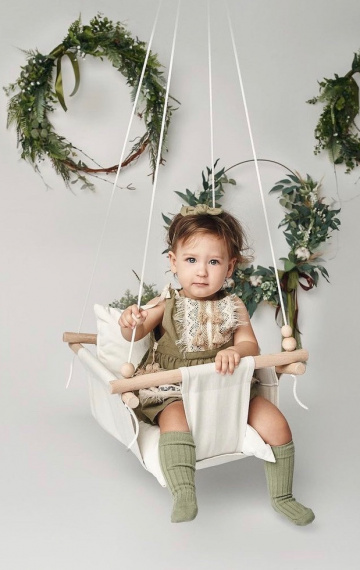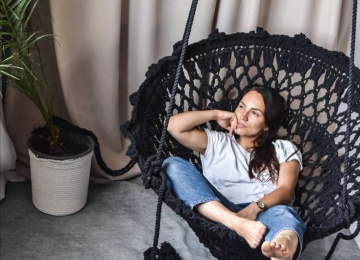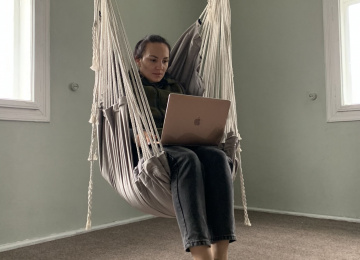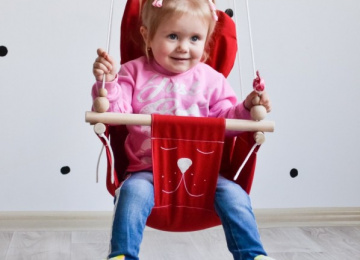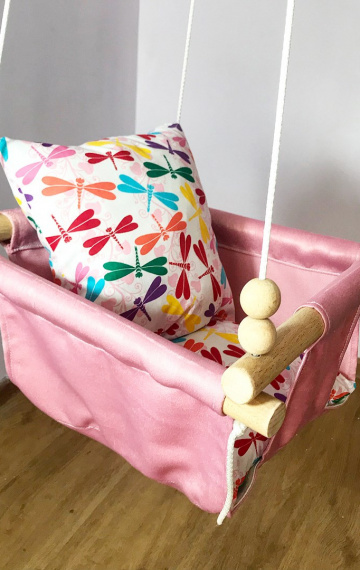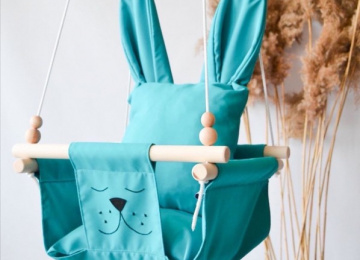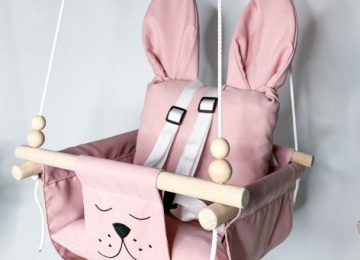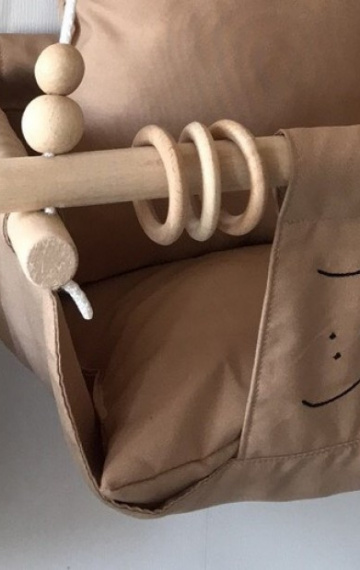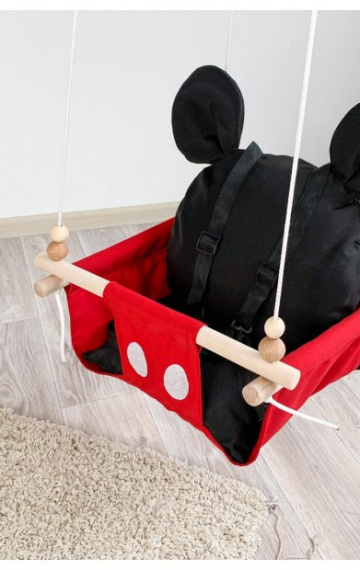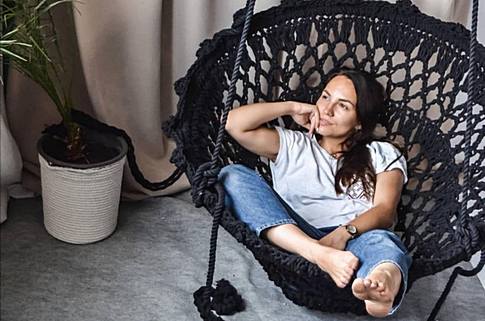
In February 2022, Ievgeniia Abdula and her husband were in Kyiv, at an exhibition of children’s goods, when they woke up to the familiar noises of sirens. They knew immediately what it meant – the war had started. The couple rushed back by train to Rubizhne, Luhansk region where they had a 7-year-old child, and together moved to Chernivtsi Oblast in Western Ukraine.
Among other things, they also took something of great importance – their business.
Six years before the war, as Ievgeniia Abdula finished sewing a cover for her sofa, a piece of fabric was left. It was a cold winter day in Eastern Ukraine, and her then 7-month-old child needed something to play with at home. The simple decision she made played a major role in her life. Ievgeniia Abdula decided to make a swing.
Following the instructions on the internet, she bought a stick for a shovel, sawed it and drilled it, found a strong rope, and hung it in the doorway. Next, she put the baby inside, took a photo, and posted it on social media, saying she found a way to entertain a child inside an apartment.
What happened next came as a surprise to Abdula. She was flooded with questions about where to buy the swing.
“I immediately answered that I was selling those. After all, it was not difficult for me to make a swing. And all of this was very timely because the previous business, handmade knitwear, was slowly fading away. The swing came as a breath of fresh air because I like to sell what I create myself and be responsible for the quality and timely deliveries to the customers,” Abdula explains.
She called the company Infancy and started to look for high-quality fabrics. Doing business was something Abdula knew from years of experience in online sales. At first, she used to resell cosmetics, shoes, and bags, then turned to handmade knitwear. But back in 2016, as the items went out of fashion, sales at Abdula’s business started to decline. That’s when she had an idea to make a swing for her child.
As it turned out later, such swings were a novelty in Ukraine and became especially popular among parents with young children. Abdula makes swings for children mainly from 7 months to 5 years old, using strong ropes, water-based paints, and natural fabrics. These swings can easily be assembled and disassembled if necessary and can be used in a variety of spaces, fitting into almost any exterior or interior. Families can hang the swing both inside the house and outside, or take it wherever they go. These features, combined with safe, comfortable, and fun design elements, make Infancy swings perfect entertainment for children of different ages.
Just months after Abdula posted a photo on her social media, sales started to increase, and the company saw clients ordering from all over the world. Higher sales came with higher demands as the company needed to work faster than before and deliver on time. Abdula started to think about solutions.
Luckily, the EU and UNDP were there to support. She received a grant of UAH 153,500 (around EUR 5,000) from the EU-UNDP joint programme - “EU Support to the East of Ukraine: Recovery, Peacebuilding and Governance”, under the EU4Business umbrella and participated in the EU-funded East Expo exhibition in 2021.
“With the grant money, we purchased new equipment, which is much faster in operation and of better quality,” she says, noting having big, modern machines pushed her to move production out of her apartment. In a new space, they also made a photo studio, where parents would take photos with children and help advertise the swing.
With faster production and strong online advertising, Infancy reached customers way beyond Ukraine. Colorful swings went to Italy, the UK, Australia, Africa, Latvia, Lithuania, Germany, and even as far as the USA.
But that was about to change.
Now they rarely ship abroad, just because people are afraid that the order may not reach them, for obvious reasons. In February 2022, after Russia’s full-scale invasion of Ukraine, Ievgeniia Abdula had no other choice but to move to the western part of the country and relocate her business, leaving behind her loved ones.
“I really want to go home,” she says, noting her mother and brother are still in Rubizhne, now occupied by Russians.
Abdula continues to work amid the war, wishing to expand production and create more jobs – something the country desperately needs today. From day one, she knew she wanted to do business in Ukraine, and that’s not going to change in the future.
“I really like doing business in Ukraine because I know how everything works. Perhaps you need to be born in Ukraine to understand this whole system.”
“I took a chance with very little money to start over. In my case, the desire to work in Ukraine played a big role,” said Abdula, noting it's possible to grow your business in this country, even if you have a small budget.
Despite the war, SMEs like Ievgeniia Abdula still want to work in Ukraine and the trend would only continue after the victory.

